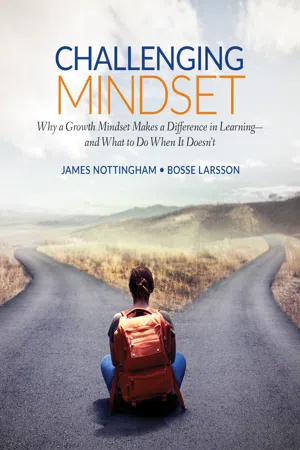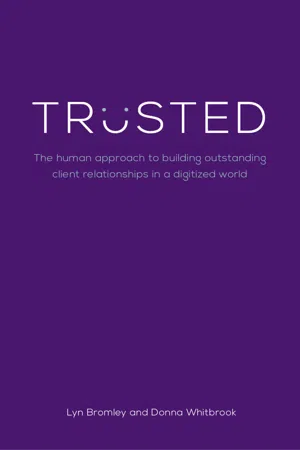Dweck's Theory of Mindset
Dweck's Theory of Mindset proposes that individuals can have either a fixed mindset, believing that abilities are innate and unchangeable, or a growth mindset, believing that abilities can be developed through effort and learning. This theory has significant implications for motivation, achievement, and personal development, as it influences how individuals approach challenges and setbacks.
7 Key excerpts on "Dweck's Theory of Mindset"
- eBook - ePub
Developing Growth Mindsets
Principles and Practices for Maximizing Students' Potential
- Donna Wilson, Marcus Conyers(Authors)
- 2020(Publication Date)
- ASCD(Publisher)
...Chapter 1 Growth and Fixed Mindsets in Education. . . . . . . . . . . . . . . . . . . . Growth mindset is based on the belief that your basic qualities are things you can cultivate through your efforts, your strategies, and help from others. —Carol Dweck, Mindset: The New Psychology of Success (2016a, p. 7) Principle 1: Understand the mindsets so that awareness is maintained with regard to which mindset one is engaged in and what impact it has on motivation and performance. Dweck (2019) identifies the distinction between a fixed mindset —the belief that intellectual abilities are static and largely unchangeable—and a growth mindset —a belief that intellectual abilities are malleable and can be improved with learning through the use of strategies, practice, and effort. Her work demonstrates that whatever type of mindset individuals adopt can have a major impact on their life across a variety of contexts—in school, with family and friends, and in the workplace. A growth mindset provides students with the motivation to succeed academically, since it allows them to see a correlation between their learning efforts, use of effective strategies, and results. According to Dweck's conceptualization of these terms, people with a fixed mindset view setbacks—like getting a bad grade or losing a tournament—as failure. Having to work hard to achieve a goal is a sign that they are not smart or talented enough to succeed. In other words, "People with a fixed mindset expect ability to show up on its own, before any learning takes place" (2016a, p. 24). Her research suggests that this mindset—which holds that people have a fixed personality, moral character, and level of intelligence—may have a damaging effect on the achievements of both adults and children. People who regard talent as innate typically believe that working hard is a waste of time...
- eBook - ePub
Challenging Mindset
Why a Growth Mindset Makes a Difference in Learning – and What to Do When It Doesn't
- James A. Nottingham, Bosse Larsson(Authors)
- 2018(Publication Date)
- Corwin(Publisher)
...1 A Tale of Two Mindsets The terms ‘fixed mindset’ and ‘growth mindset’ come from the work of Carol S. Dweck, the Lewis and Virginia Eaton Professor of Psychology at Stanford University. They are based on decades of precise research into how people think about talents and success. Figure 1: Carol Dweck at a Challenging Learning Conference, 2017 Photograph by andrewbillingtonphotography.com Everyone has a mindset that shapes their personality, motivation and development. After decades of careful and precise research, Carol Dweck has identified two main mindsets: a fixed mindset and a growth mindset. 1.0 • Definition of Mindset A mindset is a self-perception or ‘self-theory’ that people hold about themselves. Fixed Mindset : A fixed mindset refers to a belief that intelligence and abilities are relatively innate, changing very little over time. Someone in a fixed mindset is likely to think that they have ‘always’ been good at something (for example, ‘I have always been good at art’) or that they will ‘never’ be proficient at other things (for example, ‘I don’t have a mind for languages’). When someone is in a fixed mindset, they believe intelligence and abilities are innate. When responding to behaviour, someone in a fixed mindset would be likely to use generalisations that suggest a pattern of behaviour. For example, ‘why do I always do that?’. Or when observing someone else, they might think, ‘they always do that,’ ‘or that’s just how they are’. Growth Mindset : A growth mindset refers to a belief that intelligence and abilities can be ‘grown’ through experience, effort, strategy, and instruction and support from others. Genetics are seen as the starting point rather than the defining quality...
- eBook - ePub
The Underachieving Gifted Child
Recognizing, Understanding, and Reversing Underachievement (A CEC-TAG Educational Resource)
- Del Siegle(Author)
- 2021(Publication Date)
- Routledge(Publisher)
...Accordingly, gifted students who believe that their teachers or schools hold an entity theory of intelligence will more likely display behaviors associated with that entity theory, such as bragging about a test score or their IQ. Therefore, the ways in which parents and teachers talk with students about their selection for gifted services and the mindsets parents and teachers hold, as well as the ways they encourage students who excel, contribute to students’ mindsets. Dweck (1999) demonstrated that students who believe abilities can be developed and are not fixed are more likely to attempt challenging tasks and persevere through difficulties than students who believe abilities are innate. Students who have a fixed mindset approach new situations as opportunities to show what they know. Therefore, they may view any mistakes as evidence they lack ability. This can be a significant handicap in the challenging classes typically offered in gifted education. In contrast, students who have a growth mindset view new situations as opportunities to acquire new skills or improve their existing skills. They are more likely to tackle difficult tasks in order to become smarter. Although Dweck (1999) found that students already gravitate toward one or the other of these orientations in elementary school, she also found that these orientations are amenable to change, so parents’ and teachers’ roles should be to encourage a growth mindset. Developmental Theories of Giftedness Joseph Renzulli and Françoys Gagné are two theorists in gifted education whose work fits well with the growth mindset that Dweck has proposed. Renzulli (2005) has preferred to label the behavior rather than the student. Instead of saying a particular child is gifted, he has recommended that the behaviors the student is displaying be labeled. For him, gifted is an adjective, and he suggests that giftedness is brought to bear upon some performance area...
- eBook - ePub
50 Psychology Classics
Who We Are, How We Think, What We Do
- Tom Butler Butler Bowdon, Tom Butler Bowdon(Authors)
- 2010(Publication Date)
- Nicholas Brealey Publishing(Publisher)
...2006 Mindset “Whether human qualities are things that can be cultivated or things that are carved in stone is an old issue. What these beliefs mean for you is a new one: What are the consequences of thinking that your intelligence or personality is something you can develop, as opposed to something that is a fixed, deep-seated trait?” “In the fixed mindset, everything is about the outcome. If you fail—or if you’re not the best—it’s all been wasted. The growth mindset allows people to value what they’re doing regardless of the outcome. They’re tackling problems, charting new courses, working on important issues. Maybe they haven’t found the cure for cancer, but the search was deeply meaningful.” In a nutshell There are two fundamentally different ways of seeing intelligence, ability and success: people with a “growth” mindset see life in terms of fulfilling their potential; those with a “fixed” mindset are concerned with proving they are smart or talented. In a similar vein Alfred Adler Understanding Human Nature (p 16) Albert Bandura Self-Efficacy (p 30) Howard Gardner Frames of Mind: The Theory of Multiple Intelligences (p 126) Daniel Goleman Working with Emotional Intelligence (p 140) Walter Mischel The Marshmallow Test (p 230) CHAPTER 12 Carol Dweck A s we know from our own experience and by observing the lives of others, raw intelligence does not equate with success. Many other factors come into the success equation, including beliefs. If you believe that intelligence is a fixed quantity given at birth, for instance, then your life will be about proving to others that your fixed amount is high. You have to look smart and act smart if you want people to think you really are smart...
- eBook - ePub
The Return to Study Handbook
Study Skills for Mature, Distance, and Workplace Learners
- Chloe Burroughs(Author)
- 2019(Publication Date)
- Kogan Page(Publisher)
...05 Mindset Do you ever think these things when you’re studying? I’m just not that smart. I don’t get this at all. This is too hard, I want to give up. I can’t improve. You’re either good at studying or you’re not – and I’m not. These statements originate from a fixed mindset, which Stanford Psychology Professor Carol Dweck explains is the belief that intelligence is unchangeable (Dweck, 2017). Your intelligence is fixed, so some people are smart and some people aren’t. On the other hand, growth mindset is the belief that intelligence is malleable, that it can be developed. Students with a growth mindset believe they can become more intelligent with hard work, perseverance, self-belief and the right study strategies. Carol Dweck and her co-authors, Lisa Blackwell and Kali Trzesniewski, conducted two studies in a New York junior high school to discover the impact of students’ beliefs around intelligence on their maths scores (Blackwell et al, 2007). The first study followed four waves of students over two years from when they started seventh grade (aged between 12 and 13). The 373 students were asked to complete questionnaires on their beliefs and motivations around intelligence, effort and academic achievement. From this they determined whether each student exhibited a fixed mindset or a growth mindset. At first, there wasn’t much difference between the maths scores of the two groups. But by measuring their progress and grades over seventh and eighth grade, they found a link between beliefs around achievement and actual grades achieved. Overall, the students with a growth mindset increased their scores compared to the fixed mindset students whose scores plateaued or even decreased. A second study was conducted to see if teaching students that their intelligence can be increased would see an actual improvement...
- eBook - ePub
Trusted
The human approach to building outstanding client relationships in a digitised world
- Lyn Bromley, Donna Whitbrook(Authors)
- 2017(Publication Date)
- Practical Inspiration Publishing(Publisher)
...She also determined the power of mindset and the profound affect it can have on our lives. Prior to her research, she held the belief that we couldn’t get smarter; whatever we were born with was what we had. Through her research, she has discredited her original belief and proven that we can become smarter. Do you have a fixed or growth mindset? People with a fixed mindset: • believe that intelligence is fixed and their qualities are carved in stone • avoid challenges • give up easily • don’t see the value of effort • avoid negative feedback • are threatened by others’ success, and • shy away from challenges for fear of being exposed. People with a growth mindset: • believe that intelligence can be developed and their qualities can be cultivated through effort • embrace challenges—in fact, they relish challenge • see effort as a path to mastering a skill • learn from criticism • incorporate learning and get inspiration from others’ success, and • believe that we don’t all have the same talents and abilities but that we can all grow through hard work, mentorship and perseverance. Depending on which mindset we operate in, we either narrow our world or widen it. Those with fixed mindsets narrow their world to appear as though they are achieving, whereas those with growth mindsets open up their world so they can look for opportunities and challenges, allowing them to grow. Many people have elements of both mindsets, and different mindsets for different areas. For example, a person could have great social skills but think she is incapable of standing up and delivering a presentation for a group. Someone could have a great business mind but think he is unable to master new gadgets. Beliefs are powerful...
- eBook - ePub
- Howard Burton(Author)
- 2021(Publication Date)
- Ideas Roadshow(Publisher)
...They understand that one’s potential for achievement is not fully fixed in advance according to some innate, abstract criteria—rather, it is firmly linked to a willingness to work hard and develop. This view, Carol hastens to point out, is not simply the latest in popular self-help, but fully supported by modern neuroscientific views of the plasticity of the brain. Through the vital process of grappling with difficult problems and the act of struggling to make progress, we actually strengthen and reinforce vital neurological connections, thereby, as she puts it, “growing our brains.” Learning how to address difficult problems and master important new techniques, it turns out, literally makes us smarter. Meanwhile, those who are mired in what she calls a “fixed mindset” believe something quite different. For them, working hard is something that only less talented (less intelligent, less gifted) people need do. This way of thinking clearly runs the risk of leading to a sense of complacency and unwillingness to push oneself. But it is actually much worse than that: those in a fixed mindset not only naturally shirk new challenges (why needlessly risk one’s position at the top of the hierarchy?), they inevitably become so consumed with defending their place on the social and intellectual hierarchy that they soon entirely stop learning and developing for its own sake. Curiosity and passion naturally fall by the wayside once one becomes preoccupied with simply keeping up appearances and reputations. In other words, all of this goes considerably beyond simply mouthing platitudes about the value of hard work. After all, those in a fixed mindset work hard too—they expend considerable effort and suffer significant amounts of stress convincing everyone that they are naturally accomplished. It is not that they are inherently lazy or incapable of working hard. It is that their very worldview, their mindset, renders the idea of such work both distasteful and embarrassing...






